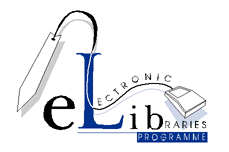CLIC: Consortium Electronic Journal Project
- Project web site
-
http://www.ch.ic.ac.uk/clic/
- Programme area
-
Electronic Journals
- Contact details
-
Dr Henry Rzepa, Project Director,
Department of Chemistry Imperial College of Science, Technology and Medicine
Phone: 0171 594 5774 Fax: 0171 594 5804
Email: rzepa@ic.ac.ukDr David James, Manager, Electronic Primary Publications,
Royal Society of Chemistry
Phone: 01223 420066
Email: JAMESD@rsc.org
Project description
as of January 4th 1996
Introduction
This project in the Electronic Libraries Programme (eLib) will establish a parallel electronic version of the Royal Society of Chemistry's journal, Chemical Communications.
Description
Chemistry is central to many '21st century' areas such as the development of molecular computers, high temperature superconductors, new materials, medicines, and advances in biotechnology. The principle vehicle for reporting important new results and breakthroughs remains the scholarly journal, a medium which hitherto has remained rooted on the two dimensional and largely monochromatic printed page. The primary objective of the CLIC consortium is to introduce and set standards for fundamentally new ways of communicating molecular science, not only to the specialists but to a much larger and diverse audience in both the education and the industrial sectors. Our intention is to enhance the perception, understanding, availability and most importantly the quality of scientific knowledge.The project will be based on the creation of an electronic version of the flagship journal Chemical Communications, a forum for disseminating preliminary accounts of important developments in chemistry.
A fundamental aspect of this electronic journal will be the use of recently developed global standards for the transmission of chemical information on the Internet, allowing a diversity of numerical and symbolic information to be associated with journal articles. This will enable the reader to create for themselves visual representations of molecules and their properties in a way which will substantially enhance the value of the information content. Training materials and other special projects which serve to raise awareness amongst scientists of the possibilities of this new medium are a high priority for the project. The diffusion of these new publishing techniques into the teaching of science in schools and universities will help to train and motivate the new generations of scientists and technologists needed for the next millennium.
The first stage of the CLIC project will be to deliver graphically enhanced abstracts of conventionally submitted and printed articles in Chemical Communications. In parallel, an electronic conference is being organised (ECTOC-1) which makes use of similar electronic techniques, and which will serve to provide early user feedback and to raise global awareness of the new medium. As the CLIC project develops, the entire content of the papers in the journal will be made available in this form. Important issues such as the development of authoring tools, security, user validation, cost recovery mechanisms, library use, archiving, and peer recognition will be addressed as part of the project. The final stage of the project will be to develop forms of chemical communication which have no printed equivalent, such as molecular hyper-glossaries and other value added services. In effect, the intent is to transform the conventional scientific scholarly work into an interactive and highly visual experience, just as much an important scientific tool as chemical apparatus and instruments are now regarded.
Participants
The Royal Society of Chemistry will publish Chemical Communications in parallel electronic and printed form, and will co-ordinate the editorial and production aspects of the electronic journal. Specific aspects of training, development and special projects will be co-ordinated at the three chemistry departments at Imperial College, London, Leeds and Cambridge Universities. Techniques such as video-conferencing, molecular white-boarding and other innovative electronic technologies will be used and developed to facilitate the collaborations.

